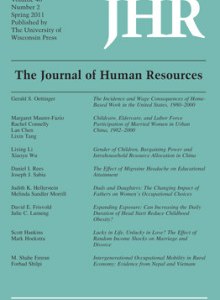
Barbetta, G., Sorrenti, G. and Turati, G. (2021). Multigrading and Child Achievement Journal of Human Resources, 56(3):940--968.
-
Affiliated author
-
Publication year2021
-
JournalJournal of Human Resources
We study how multigrading, which is mixing students of different grades into a single class, affects children{\textquoteright}s cognitive achievement in primary school. We build instruments to identify the causal effect of multigrading by exploiting an Italian law that controls class size and grade composition. Results suggest that attendance in multigrade versus single-grade classes increases students{\textquoteright} performance on standardized tests by 19 percent of a standard deviation for second-graders, and it has zero effect for fifth-graders. The positive impact of multigrading for second-graders appears to be driven by children sharing their class with peers from higher grades. This last finding rationalizes the absence of a multigrade effect for fifth-graders.